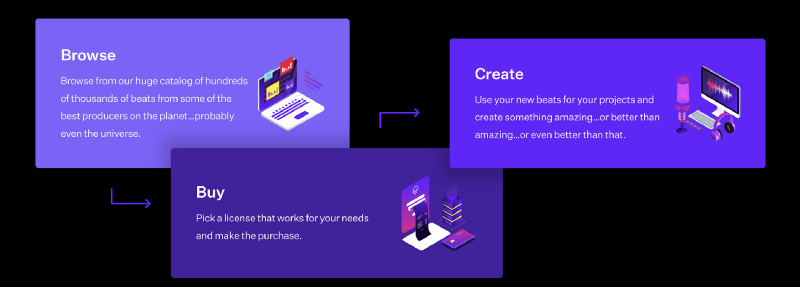Beats Mean Business: Independent, Tech-First Beats Marketplace Airbit Wants Creators to Build…
Everything has changed for music producers. Once the hidden wizards of the studio, producers have jumped out in front and found their own…
Everything has changed for music producers. Once the hidden wizards of the studio, producers have jumped out in front and found their own independent business paths online, thanks in part to Airbit.
“The mentality among producers is shifting compared to 10 years ago,” explains Wasim Khamlichi, founder and CEO of Airbit. “People used to look down on producers who sold their beats online. There’s no stigma now.”
More than a beats or sound pack store, Airbit evolved to make it easy for producers to expand their professional options and revenue streams. Airbit’s Infinity Store features and YouTube monetization, unique among beat marketplaces, allow producers everywhere to create a branded, customizable site to present and sell beats and sounds, much like a Shopify for producers, and to maximize the money they earn from their work, no matter where it pops up.
With 800,000 creators on the platform and growing fast, Airbit has attracted established producers like multiple GRAMMY-winner S1 (Kanye West) and serious contenders, including Cyanide (Smokepurpp), KingDrumDummie (NBA YoungBoy), TnTXD, Ric & Thad (Tierra Whack, Bad Bunny), and The Beat Menace (Meek Mill, Pop Smoke).
For Khamlichi, computers had been an obsession since childhood, and by the time he was 16, he was building software for the UK government.
“I started realizing everyone around me there was miserable,” he recounts, “and I saw it wasn’t where I wanted to be.” Khamlichi knew where he wanted to be, however, after an epiphany when he landed at an Eminem concert thanks to a friend’s extra ticket. “I knew then that I had to be involved with music,” he recalls.
His love of music and computers collided. Khamlichi got into music production and made his own beats as a hobby. As he got deeper into music, he decided to build his own online store to sell his beats. “Producers were the last to get credit, the last to get paid. There were no marketplaces back in the day,” he says. “You had to find your own customers and figure out your own online store.” Khamlichi’s solution, crafted in Flash, caught the eyes of friends and acquaintances, and soon he was building stores for other producers and beatmakers.
His customer base grew and grew, until it made sense to set up a marketplace to connect the producers and artists swirling around hundreds of individual sites. Khamlichi and team made some serious tech overhauls (including ditching Flash). The result was Airbit.
Airbit allows producers to join the site on a freemium basis, with higher paid tiers unlocking more customizable tools and more extensive monetization. Licenses let artists lease a beat — use it in specific ways for a specific period of time — or buy it, giving full exclusive rights to the artist. Producers can set their price points and terms and can use their storefront as a standalone site or embed it in an existing website.
Airbit strives to do more than broker beats, however. It wants to nurture a community and create a truly sustainable way for producers to build a career online and off, by bringing more relevant tools together in a single place. That includes the unglamourous but vital realms of monetization and publishing, elements treated as frills or afterthoughts by other marketplaces. Airbit is the only beats marketplace that allows its producer members to join YouTube’s ContentID, no easy feat for independent creators. The ContentID system flags beats that appear in uploaded content and notifies producers, so they can better monetize their work and monitor license terms. The platform’s strong producer focus has led to several global hits, uncounted new opportunities, and even a few producers who asked to invest in Airbit.
Producers’ expanded options are influencing how artists create, too. Part of this change connects to broader music listening trends that are blurring genre lines and upending music categorization. Airbit wants to set the stage for the coming genreless future. “Let’s stop the labelling. Let the music be free; don’t force it to conform to specific rules,” reflects Khamlichi. “Hip hop isn’t a genre, for example; it’s a culture. It’s infiltrated every other music scene and style.”
For many creators, the goal isn’t to find something that’s their genre, but to find beats that echo the aesthetic of a specific popular artist or producer, so-called “type beats.” There’s an aspirational and inspirational quality to how artists search, a quality that categories like genre may not capture. “Our dream is to do away with having to translate the sound you’re shooting for into search terms. Right now, we’re rolling out new features that allow creators to search by sound, but it could be even more advanced in the future. Artists always have ideas for melodies. Imagine you could hum into your phone or tap out a rhythm and then find the perfect beat to match. You could give us your idea and see if someone already created a track for that melody.”
Airbit’s creator-focused, tech-first spirit harkens back to Khamlichi’s first online store and still drives the company today, as it expands into everything from blockchain-based digital collectibles to AI-driven search. “We’re independent and plan to stay that way, like many of the producers and artists who use Airbit,” Khamlichi states. “We see that supporting and developing independent creators instead of buying them out, is the future of a sustainable and equitable music industry.”
=======================================
🎵 Subscribe today for your daily rundown of the most important & interesting music streaming news
✉️ Send story ideas & feedback to: jeff@platformandstream.com
⭐️ Support Platform & Stream by sponsoring an issue sent to our 2200+ subscribers every weekday.
☕️ Or you can support us with a coffee




